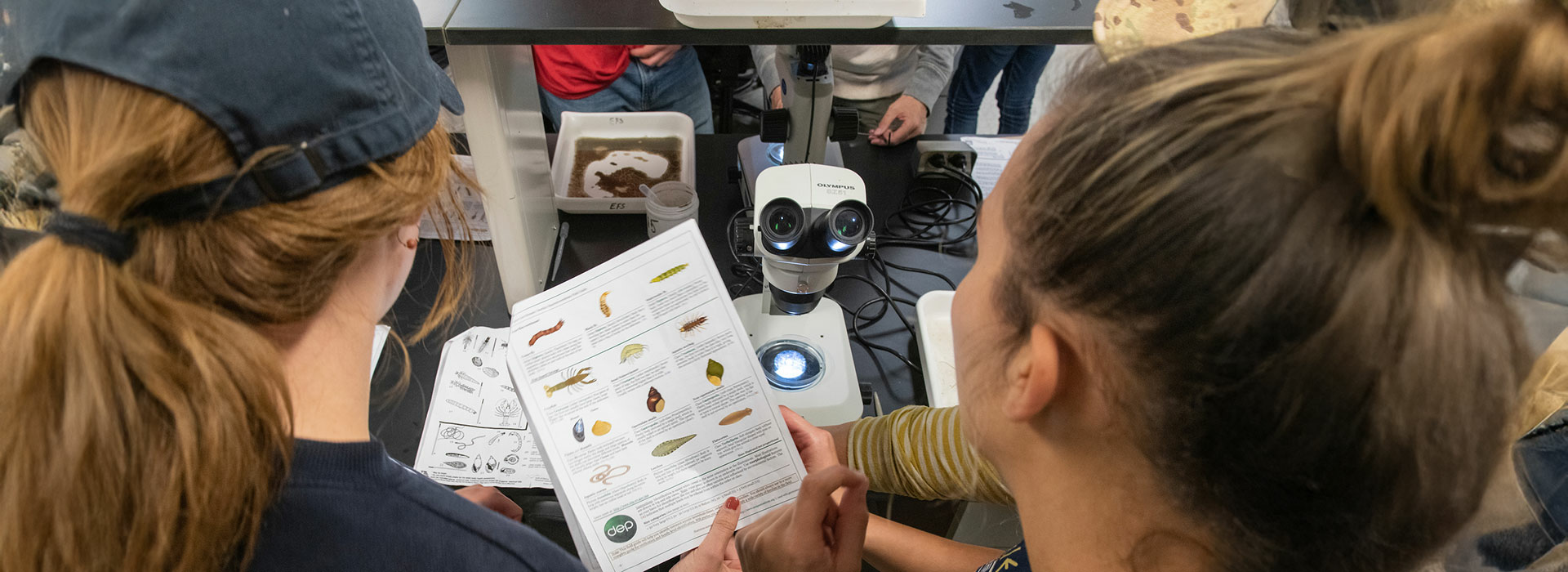Unearth Your Passion for the Environment with a B.A. in Environmental Studies
Embark on a journey to understand, protect and preserve our planet through our B.A. in Environmental Studies program. This comprehensive program equips you with the knowledge and skills to tackle pressing environmental challenges.
Learning Outcomes
- Develop basic interdisciplinary literacy in the natural sciences, social sciences and the humanities as they contribute to an understanding of environmental issues.
- Critically analyze environmental problems by integrating evidence from multiple sources.
- Critically evaluate the ethical implications of environmental actions and engage in responsible decision-making.
- Identify key stakeholders involved in environmental issues and understand their perspectives, values and objectives.
- Acquire knowledge of the historical roots of environmental problems and the impact of human and natural activities over time.
- Skillfully address environmental issues through appropriate policies and regulations.
- Work collaboratively and productively in interdisciplinary professional settings with people from diverse backgrounds with different types of expertise.
- Communicate effectively and persuasively (orally, visually and in writing) and adjust communication styles to fit the intended audience.
- Develop, implement, manage and evaluate short-and long-term solutions to environmental problems.
- Develop expertise in environmental policy analysis.
- Master sustainability practices and natural resource management.
- Understand the role of environmental ethics and advocacy.
Calendar
Don't miss an important date or deadline
Designed for working professionals, UIS programs feature multiple start dates per year, so you can begin at the time that best fits your schedule and complete your degree quickly. View the Academic Calendar

Tuition & Aid
UIS is the most affordable option to earning your University of Illinois degree. Earn a world-class education for less than you’d expect.
Value of a UIS Degree

UIS is No. 5 for students graduating with the least amount of debt, Midwest Region (2021).

Top 25 best value school, Midwest Region, and the only public university in Illinois on the list (2022, 2023, 2024).

98% of students receive aid
The average graduate from UIS will see an increase in earnings of $31,700 - $69,000 each year compared to someone with a high school diploma working in Illinois.
Admissions
Applying to UIS is simple
We've streamlined our admission process to save you time and effort. Just follow the steps below.
Review admission requirements
No specific admission requirements are listed at this time. Please contact the Office of Admission for more information.
International students, will you need an F-1 student visa to study on campus at UIS? Please review the International Applicants site for additional information.
Complete your application
An email address is required to create an account. To submit a paper application, visit the Resources & Forms page. Find more information about what type of student you are on the Student Types page. Applying for an online program is the same procedure as applying for an on-campus program.
Send your official transcripts
Email your official or certified academic records/transcripts to incomingtranscripts@uis.edu or through any of the major transcript platforms. Photocopies will not be accepted.
Submit required statements/writing sample
If you are a first-year student, a statement of 250-650 words is required for admission. We want to hear about your professional aspirations, intellectual interests, and personal experiences relevant to your choice of a specific academic program. You can upload the required documents on you're application status page.
Pay your application fee
You can submit your non-refundable application fee online, after completing the online application. Alternately, it can also be mailed to the university, payable to University of Illinois Springfield.
Domestic students: Undergraduate - $50, Graduate - $60;
International students: Undergraduate - $60, Graduate - $75.

Courses & Catalog Information
At the University of Illinois Springfield, you'll find a wide range of courses tailored to your interests and career goals. Explore your program details and get all the essential information you need to plan your future.
Career Opportunities
Exploring the following career paths can help you see how your degree opens up a wide range of exciting and rewarding opportunities in various fields.
- Environmental Planner Assistant
- Environmental Policy Analyst
- Evaluation Manager
- GIS Specialist
- Land Use Specialist
- Natural Resource Specialist
- Policy Research Assistant
- Recycling Manager Coordinator
- Research Assistant
- Wildlife Manager
- Conservation Agent
- Forester
- Climate Change Analyst
- Ecologist
- Environmental Protection Specialist
- Resource Management Specialist
- Restoration Planner
- Environmental Educator
- Sustainability Specialist
- Lab Assistant
- Waste Water Technician
- Community Action Coordinator
- Conservationist
- Environmental Policy Analyst
- Sustainability Coordinator
- Environmental Consultant
- Urban Planner
- Environmental Educator

